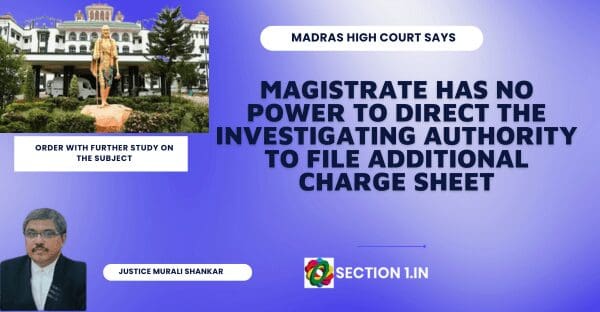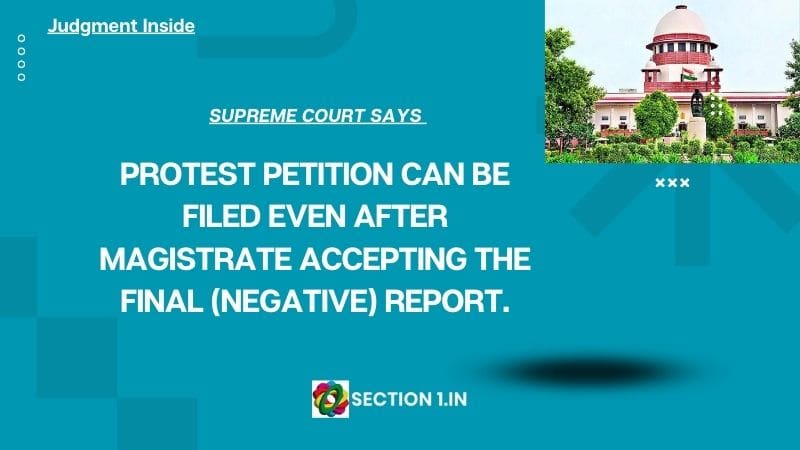FACTS
2. Under Section 272 of the Code of Criminal Procedure, 1973 (for short ‘CrPC’), the State Government has the power to determine what shall be, for the purposes of CrPC, the language of each Court within a particular State other than
the High Court. As provided in Section 6 of CrPC, there are various Courts in a State. The said Courts are the Courts of the Session, Judicial Magistrates of the First Class, Metropolitan Magistrates, Judicial Magistrates of the Second Class, and Executive Magistrates.
4. The first respondent in Criminal Appeal, arising out of SLP (Crl.) No. 10680 of 2022, is also an accused in the same case. He also made a similar application before the learned Magistrate which was rejected. The first respondent challenged the said order before the High Court. A Division Bench of the High Court by the impugned judgment held that when a charge sheet was filed in the language unknown to the accused, he was entitled to translation of the charge sheet in the language which he understands.
5. The appellant the Central Bureau of Investigation has challenged both the impugned orders.
OUR VIEW
8. The Government of Madhya Pradesh in exercise of power under Section 272 of CrPC issued a notification dated 28th March 1974, declared Hindi to be the language of each Court in the State except the High Court. If we consider the scheme of CrPC, it regulates not only the procedure before the Criminal Courts but also the procedure to be followed by the police and other investigating agencies. Chapter V deals with the arrest of persons. Chapter VI deals with processes to be issued for compelling the appearance of the accused before the Court. Chapter VII deals with processes to be issued to compel the production of things before the Court. Chapter VIII contains provisions regarding security for keeping the peace and for good behaviour. The powers under the said Chapter are to be exercised by the Courts under the CrPC or an Executive Magistrate, as the case may be. Chapter X contains the steps to be taken for the maintenance of public order and tranquillity. Chapter IX contains Section 125 which confers powers on the Courts of the Judicial Magistrate, First Class to order payment of maintenance to wives, children and parents. Chapter XI deals with the preventive action of the police. Chapter XII contains elaborate provisions regarding the registration of First Information Reports, and the investigation of offences in cognizable or non-cognizable cases.
9. Section 173 forms part of Chapter XII which contains provisions regarding a police report which is popularly known as a charge sheet. We are, therefore, reproducing Section 173 of CrPC which reads thus:
“……………”
EXPLAINING SECTION 173 Cr.P.C
10. As can be seen from subsection (2) of Section 173, after completion of the investigation, the officer in charge of the police station is under an obligation to submit a report to the learned Magistrate in the form prescribed by the State Government, giving particulars as mentioned in subsection (2). Subsection (5) is applicable in a case governing Section 170. It applies when it appears to the officer in charge of the police station that there is sufficient evidence or reasonable ground justifying the forwarding of the accused to the learned Magistrate. In such a case, along with the report, the officer in charge of the police station is bound to forward copies of the statements recorded under Section 161 of all the persons whom the prosecution proposes to examine as its witnesses. It also enjoins the officer in charge of the police station to forward all the documents or relevant extracts thereof on which the prosecution proposes to rely upon other than those already sent to the Magistrate during the investigation. Subsection (6) of Section 173 confers power on the learned Magistrate to exclude certain parts of the material produced along with the charge sheet while supplying copies thereof to the accused.
I.O HAS NO OBLIGATION TO FILE CHARGE SHEETS/REPORTS IN THE LANGUAGE OF THE COURT
11. Section 173 will have to be read with Section 207 which mandates that after cognizance is taken of the offence by the learned Magistrate on a case instituted on a police report, it is the obligation of the learned Magistrate to furnish free of cost, without any delay, copies of the police report, first information report, statements recorded under subsection (3) of Section 161 of CrPC except the portion in respect of which there is an order passed by the learned Magistrate by invoking powers under subsection (6) of Section 173, confessions and statements recorded under Section 164 and copies of the documents or relevant extracts forwarded along with the police report in accordance with subsection (5) of Section 173. When the statements of the witnesses or documents covered by subsection (5) of Section 173 are very bulky, the
learned Magistrate has the discretion to allow the accused and his advocate to inspect the said documents instead of providing copies thereof. It is pertinent to note that there is no provision either in Chapter XII or Chapter XVI of CrPC which makes it obligatory to file charge sheets/reports in the language of the Court.
12. Interestingly, the provision regarding the language of Courts in the form of Section 272 finds a place in Chapter XXIII having the heading “Evidence in inquiries and Trials”. The provision is incorporated under the subheading “A.— Mode of taking and recording evidence”. Section 272 reads thus:
“272. Language of Courts.—The State Government may determine what shall be, for purposes of this Code, the language of each Court within the State other than the High Court.”
Thus, the power of the State Government is to determine for the purposes of CrPC what shall be the language of the Courts within the State other than the High Court. The power under Section 272 is not a power to decide which language shall be used by the investigating agencies or the police for the purposes of maintaining the record of the investigation. At the highest, for that purpose, the provisions regarding the law governing the Official Language of the State may apply subject to the provisions contained in such enactment. In a given case, while prescribing a form as required by Subsection (2) of Section 173, the State Government may provide that the charge sheet must be filed in the official language of the State. Therefore, Section 272 deals with only the language of the Courts under CrPC.
18. Now, coming to the issue of the language of the final report/charge sheet under Section 173, there is no specific provision in CrPC which requires the investigating agency/officer to file it in the language of the Court determined in accordance with Section 272 of CrPC. Even if such a requirement is read into Section 173, per se, the proceedings will not be vitiated if the report is not in the language of the Court. The test of failure of justice will have to be applied in such a case as laid down in Section 465 of CrPC.
ACCUSED MUST RAISE THE OBJECTION REGARDING LANGUAGE PROBLEM AT THE EARLIEST
19. Under Section 207, it is the obligation of the learned Judicial Magistrate to supply a copy of the report and other documents as provided in Section 207 to the accused. In a case triable by the Court of Sessions, Section 208 provides for
the learned Magistrate to provide copies of the statements and documents to the accused including the statements and confessions recorded under Section 164 of CrPC. When a copy of the report and the documents are supplied to the accused under Section 207 and/or Section 208, an opportunity is available for the accused to contend that he does not understand the language in which the final report or the statements or documents are written. But he must raise this objection at the earliest. In such a case, if the accused is appearing in person and wants to defend himself without opting for legal aid, perhaps there may be a requirement of supplying a translated version of the charge sheet and documents or the relevant part thereof concerning the said accused to him. It is, however, subject to the accused satisfying the Court that he is unable to understand the language in which the charge sheet is submitted. When the accused is represented by an advocate who fully understands the language of the final report or charge sheet, there will not be any requirement of furnishing translations to the accused as the advocate can explain the contents of the charge sheet to the accused. If both the accused and his advocate are not conversant with the language in which the charge sheet has been filed, then the question of providing translation may arise. The reason is that the accused must get a fair opportunity to defend himself. He must know and understand the material against him in the charge sheet. That is the essence of Article 21 of the Constitution of India. With the availability of various software and Artificial Intelligence tools for making translations, providing translations will not be that difficult now. In the cases mentioned aforesaid, the Courts can always direct the prosecution to provide a translated version of the charge sheet. But we must hasten to add that a charge sheet filed within the period provided either under Section 167 of CrPC or any other relevant statute in a language other than the language of the Court or the language which the accused does not understand, is not illegal and no one can claim a default bail on that ground.
CENTRAL AGENCIES CANNOT FILE IN THE LANGUAGE OF CONCERNED COURT IN EVERY CASES
20. There is one more aspect of the matter. There are central agencies like the National Investigation Agency, Central Bureau of Investigation, etc. These agencies investigate serious offences or offences having wide ramifications. Obviously, such central agencies, in every case will not be in a position to file the final report in the language of the concerned Court as determined by Section 272 of CrPC.
21. Now, coming to the facts of the case, in Criminal Appeal arising out of SLP (Crl.) 5525 of 2018, a finding of fact was recorded by the trial court that the respondent is an educated person. The offence relates to an examination for which one of the eligibility conditions was having a knowledge of the English language. Moreover, it was found that the advocate engaged by him also knows the English language. Coming to the Criminal Appeal arising out of SLP (Crl.) 10680 of 2022, the trial court has recorded a finding that the first respondent accused was a science graduate having knowledge of the English language. Moreover, his advocate was conversant with the English language.
22. Hence, in the facts of the cases in hand, it cannot be said that a non supply of translation of the charge sheet and other documents to the accused in both appeals will occasion a failure of justice.
PARTY: Central Bureau of Investigation vs Narottam Dhakad & Anr – CRIMINAL APPEAL NO. 2592 OF 2023 – August 25, 2023 – 2023 INSC 770.
https://main.sci.gov.in/supremecourt/2018/14968/14968_2018_11_1501_46430_Judgement_25-Aug-2023.pdf






